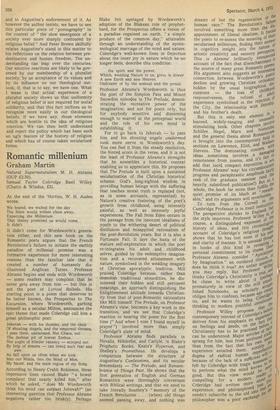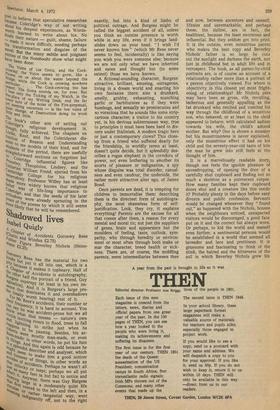Romantic millenium
Graham Martin
Natural Supernaturalism M. H. Abrams (OUP £3.50).
Samua/ Taylor Coleridge Basil Willey (Chatto & Windus, £3).
At the end of the 'thirties, W. H. Auden wrote: We hoped; we waited for the day The State would wither clean away, Expecting the Millenium That theory promised us would come, It didn't.
It didn't come for Wordsworth's generation either, and this new book on the Romantic poets argues that the French Revolution's failure to initiate the earthly paradise of millenial promise was a formative experience for more interesting reasons than the familiar tale that it created a number of humanely disillusioned Anglican Tories. Professor Abrams begins and ends with Wordsworth — some readers may complain that he never gets away from him — but this is not the poet of Lyrical Ballads. His starting point is a poem that deserves to be better known, the Prospectus to The Excursion, where Wordsworth, garbing himself as a secular Milton, announces the epic theme that made Coleridge call him a great philosophic poet: Jehovah — with his thunder, and the choir Of shouting Angels, and the empyreal thrones, I pass them, unalarmed. Not Chaos, not The darkest pit of lowest Erebus, Nor aught of blinder vacancy — scooped out By help of dreams — can breed such fear and awe As fall upon us often when we look Into our Minds, into the Mind of Man, My haunt, and the main region of my Song.
According to Henry Crabb Robinson, these impressive lines caused Blake "a bowel complaint that nearly killed him," after which he asked, "does Mr Wordsworth think his mind can surpass Jehovah?" (an interesting question that Professor Abrams negatives rather too briskly). Perhaps Blake felt upstaged by Wordsworth's adoption of the Blakean role of prophetbard, for the Prospectus offers a vision of a paradise regained on earth, "a simple produce of the common day," attainable through an understanding of the epistemological marriage of the mind and nature. Coleridge's well-known lines in Dejection about the inner joy in nature which he no longer feels, describe this condition: the spirit and the power, Which, wedding Nature to us, gives ;n dower A new Earth and new Heaven.
Undreamt of by the sensual and the proud.
Professor Abrams's Wordsworth is thus the poet of the Simplon Pass and Mount Snowdon episodes in The Prelude, demonstrating the recreative power of the imagination; and not for poets only, but for anybody sensitive and discerning enough to marvel at the perceptual world and the role of his own mind in establishing it.
For to go back to Jehovah — to pass him and his shouting angels unalarmed took more nerve in Wordsworth's day. You can feel it from the steady resolution, the hinted scorn in the verse, and it is not the least of Professor Abrams's strengths that he assembles a historical context enabling us to appreciate this. He proposes that The Prelude is built upon a sustained secularisation of the Christian historical scheme. God's long-sighted wisdom in providing human beings with the suffering that teaches moral truth is replaced (not, as in some accounts, represented) by Nature's creative fostering of the' poet's growth from childhood, using intensely painful, as well as intensely joyful experiences. The Fall from Eden occurs in the passage from the innocent idealisms of youth to the withering desert of political disillusion and misapplied rationalism of the post-Revolution years. But it is also a Fortunate Fall. It lays the basis of the mature self-exploration in which the poet re-integrates his adult and childhood selves, guided by the redemptive imagination and a recovered attunement with nature, symbolised in the wedding imagary of Christian apocalyptic tradition. Mill praised Coleridge because, rather than demolish traditional absurdities, he disinterred their hidden and still pertinent meanings, an approach distinguishing the Enlightenment attitude towards Christianity from that of post-Romantic rationalists like Mill himself. The Prelude, on Professor Abrams's view, becomes a key work in the transition, and we see that Coleridge's reaction to hearing the poem for the first time (" And when I rose I found myself in prayer ") involved more than simply Coleridge's state of mind.
Professor Abrams finds parallels in Novalis, HOlderlin, and Carlyle, in Blake's Prophetic Books, Keats's Hyperion, and Shelley's Prometheus. He develops a comparison between the structure of Augustine's Confessions, and its secular descendants — The Prelude, and Remembrance of Things Past. He shows that the first generation of English and German Romantics were thoroughly conversant with Biblical writings, and that we need to take literally Southey's "memory of the French Revolution . . . (when) old things seemed passing away, and nothing was dreamt of but the regeneration human race." The Revolution's of the Spectator, March 4, 1972 involved something more than the appointment of liberal idealism. It force" secularised millenium, finding their answer, the poets to re-assess the meaning of their artistic creativity and sensory p in cognitive insight into the nature of This is Abrams' brilliantly unexpecte.d account of the fact that disenchantmerit Is the source of many great Romantic poops' His argument also suggests an interestn!g connection between Wordsworth's P°etIc failure decline and growing Christian oerrtcheoPdtol.: hidden by the usual biographical d's; cussions — the loss of childhoniut responsiveness, the refusal of adu f experience symbolised in the reiectiuri ° the City, the relationship with and his brother's death. DorothY' learned, this is only one element iri 3 stimulating book.chaanpdterr sualbre Schiller Hegel, Marx and involv is brought into the contemporary and the general thesis about Romanticis.n. field l sections on Lawrence, Eliot, and Wallace.th ideas sometimes involves Stevens. The dominating concern Wi..„ a darnagil;ab remoteness from poems, and it's fair„nt Professor Abrams' add that lucid compact exposition 'is ,.„ progress and paraphrastic amplitude faitrb`Ye reek of the graduate seminar (and 5 a heavily subsidised publication?) Blit„ a the lNi etszche, whole, the book far more than fulfil's rx. way: his circumlocal.oy., quiet promise of its blurb as " rein,e. able," and its arguments will reverbera'the TO turn from the Cornell to ,ive. Cambridge Professor is in itself iostruc'but The perspective shrinks to England„ of the style improves. Professor WilleY s' the course, a distinguished exponent o',,ical reus history of ideas, and this chronolooubs_pbt account of Coleridge's ligio thease shows that he has lost none of his (oh th a and clarity of manner. It is unusual in books of this kind in revealiug s personal commitment to its rherri–dypse p Doe Professor Abrams consider" AP(3e , rri 01'by Imagination " an outdated illus`fstloP, does he think it true? An unfair quw" ifeY thinks Coleridge's Christianity is irlinerbaPs you may reply. But Professort e, and he chose to write about it ,'I'unpuir prematurely in view of the stil' scole lished Notebooks, as scholarl e Y creePs obliges him to confess), because agleridge's on, and he wants to bring C.,,i9eliever5' thinking to modern youthful un-" t the Professor Willey proposes thahaliefs contemporary interest of Coleridge'ser'lenoe, derives from his emphasis on fact ttlat on feelings and deeds, on the `,3efore,it Christianity has to be practised ",f foitP sprang for him, less from Prof°11.„11, nOra, can be understood. Major articles cr5toclYi than from the fact that his ov'Lly til' experience entailed them, ncituerfecde0 dogma of radical human ihillt will because of the lack of a sUffiCiell nesS "; felt by Coleridge with tragic keens to 13; to perform what the mind Rile If good. But this view would oder s compelling for a modern reat 111 Coleridge had written more aleu„s's. 0l11; experience, and philosophised that t.ise needn't subscribe to the old idea for ' philosopher was a poor exchange Poet to believe that speculative researches becarne Coleridge's way of not writing about his deepest experiences, as Words'fled to write about his. No doubt their nature — guilt, shame, failure --Made it more difficult, needing perhaps the transformation and disguise of the novel. entries But the many subtle and poignant of the Notebooks show what might have been done: , The Voice of the Greta, and the Cockp`r,°''' ing: the Voice seems to grow, like a p'°.wer on or about the water beyond the ,ndge, while the Cock is crowing nowhere Patti 1
cu,ar . . . The Cock-crowing too has
.eased. The The sounds on, for ever. But near r en, Only the Ticking of my Watch, in the , Place of my Writing Desk, and the far //lower note of the noise of the Fire-perpetual, zieuti seeming uncertain — is the low voice of iittr change, of Destruction doing its work e and little. The Colerid boo,k's other aim of setting out thon 'cge s religious development is, Ln 1,g''' fully achieved. The chapters on t00 °° Rent, and the Coleridgean disseerntiTI of Reason and Understanding st `0 The models of their kind, and for strudents of the period, there are usefully toaigntforward sections on forgotten but r. p Coleridge influential figures like u lestleY, Theophilus, Lindsey, and the canitarian William firend, ejected from his hetnibridge College for his religious Nerocioxy. Professor Willey has at least bent more widely known that religious Cole rd of life-long importance to orth`r,i'dge, and that the seeds of his later ye°`-`rAY were already sprouting in the rnorethe poems by which it still seems likely that he will be remembered.











































 Previous page
Previous page